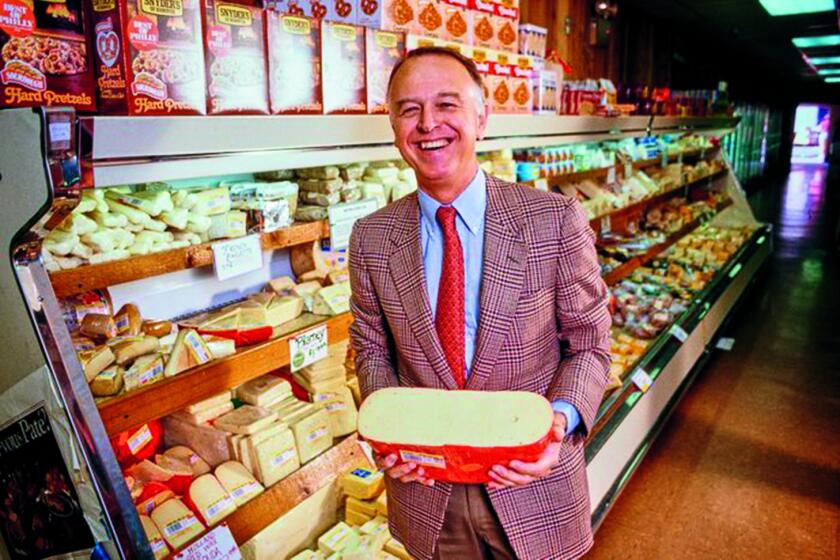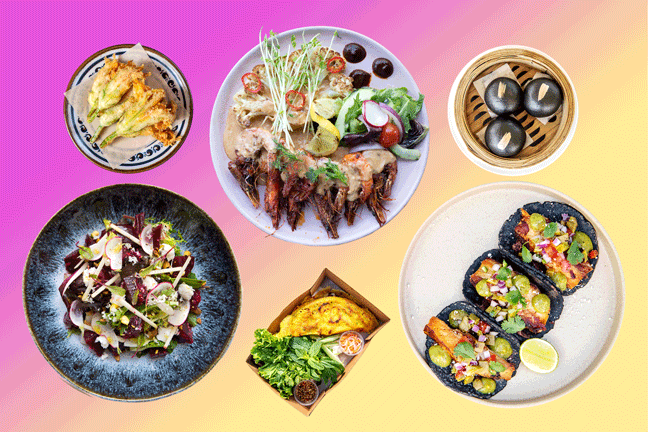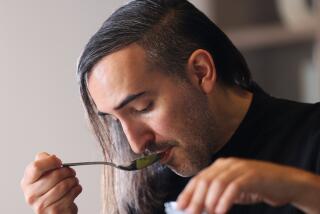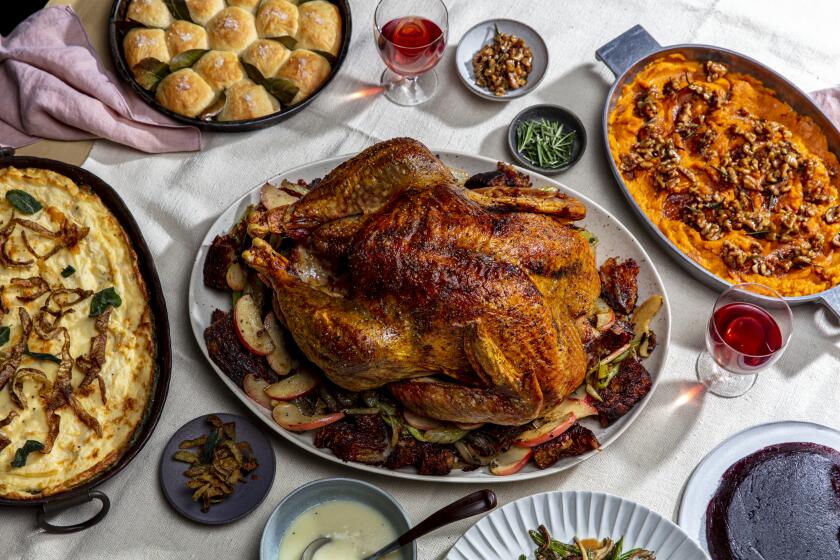âWolfgangâ: Documenting âthe best documented chef in historyâ
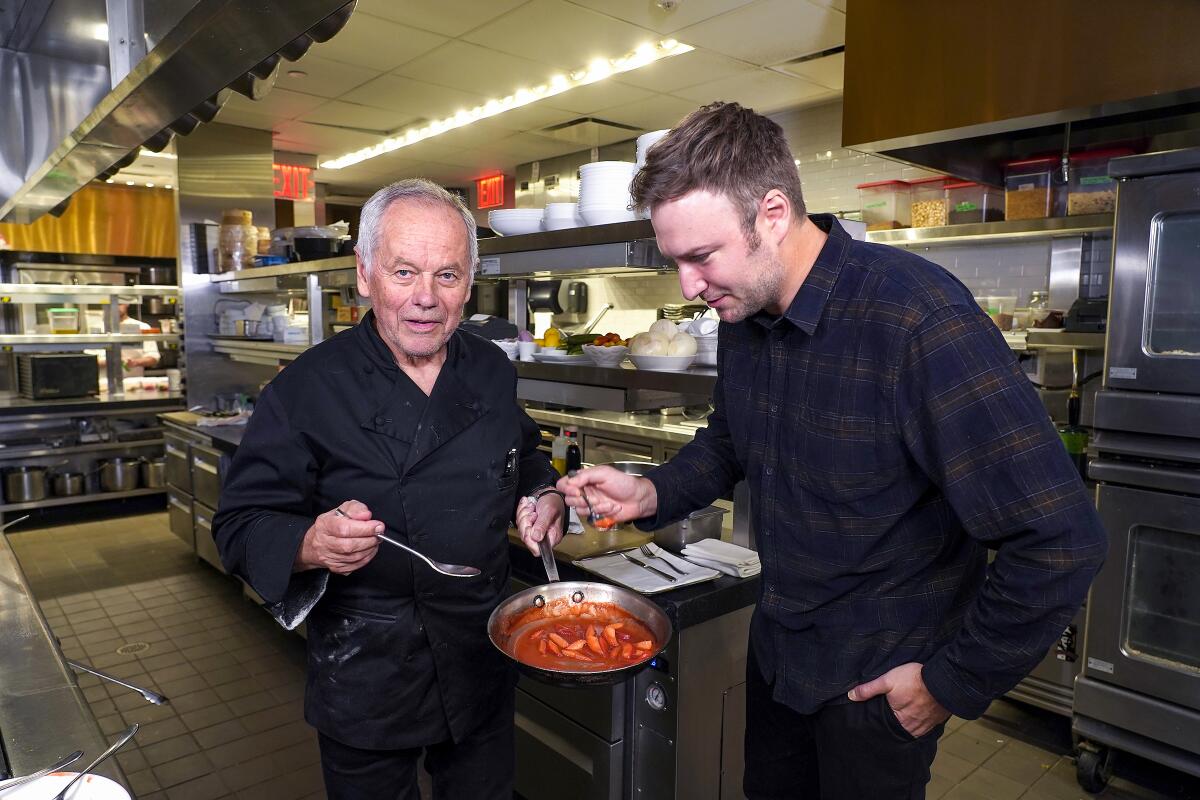
Wolfgang Puck was making the rounds in the front of his restaurant, mingling with diners â celebrity and otherwise â shaking hands and offering menu recommendations. Just another day at Spago Beverly Hills. But for one starstruck 14-year-old boy, the brief interaction almost 25 years ago was life-changing.
Over the years, their paths crossed several times. The chef went on to build a culinary empire, and the boy became a filmmaker best known for the documentary âJiro Dreams of Sushi.â A few years ago, the now-37-year-old David Gelb approached Puck about making a film about his life. The result, âWolfgang,â premiered June 12 at the Tribeca Film Festival and debuts on Disney+ on June 25.
For the record:
3:38 p.m. June 21, 2021An earlier version of this story included an incorrect name for one of Wolfgang Puckâs teenage sons. His name is Alexander.
The biodoc traces Puckâs life from his childhood in a village in Austria â in a house without running water, an indoor bathroom or a refrigerator â to his emergence as one of the worldâs best-known chefs, with a restaurant empire that spans the globe.
But the film is not simply about the rise of a chef who became a household name. âWolfgangâ tells a story of self-doubt, hard work and perseverance.
âI think the timing is right,â Puck, 71, says in an interview from his Cut restaurant in Washington, D.C. âI wanted to go back and discuss for the first time my childhood, where I grew up and how I grew up. I think maybe itâs a good thing for young people to see that you can overcome adversity and make something good.â
The life Puck was born into bears little resemblance to the starry life he leads now. His mother, Maria Topitschnig, was a pastry chef at a resort, a single mom who married Josef Puck, a coal miner, when Wolfgang was young. Some of Puckâs fondest memories involve spending time at his motherâs side as she cooked â something that also allowed him to escape his stepfather.
Trader Joe founder Joe Coulombe, who died last year, wrote a long, entertaining history of one of L.A.âs most iconic chains. Now you can read it.
Josef Puck terrorized his stepson, calling him lazy and searing into the young boyâs mind that he would never amount to anything. He was physically abusive not only to Puck but to Puckâs mother and sister. Even today, when he speaks of his stepfather, his voice hardens.
âI spent my whole life hating my stepfather,â Puck says. âIf it wouldnât have been for my mother, I think I would have never talked to him again.â
When Puck was 14, he left home to take a job as a cookâs apprentice at a hotel and never looked back. His stepfather told the teenager he would fail and would be back home in a month. âI decided at that moment I wanted to prove him wrong,â Puck recalls.
The film follows Puckâs progression as a chefâ working at the Michelin-starred restaurant LâOustau de Baumanière in Provence under famed French chef Raymond Thuillier, clashing with Patrick Terrail at Ma Maison and relishing the breakout success of Spago and beyond.
Though Puck â who has earned his own Michelin stars â is used to being in charge, he put his trust in Gelb, who also created the Netflix series âChefâs Tableâ and âStreet Food.â
Gelb, who began researching and shooting the film in 2018 while working on his Netflix shows, calls âWolfgangâ a labor of love. âPeople who have known Wolfgang to this point, they see him with celebrities, they see him at the Oscars, they see him on talk shows â this bubbly, comedic, really fun personality. And thatâs a big side of who he is,â Gelb says. âBut thereâs also an introspective side; thereâs a quiet side that has a story to tell.â
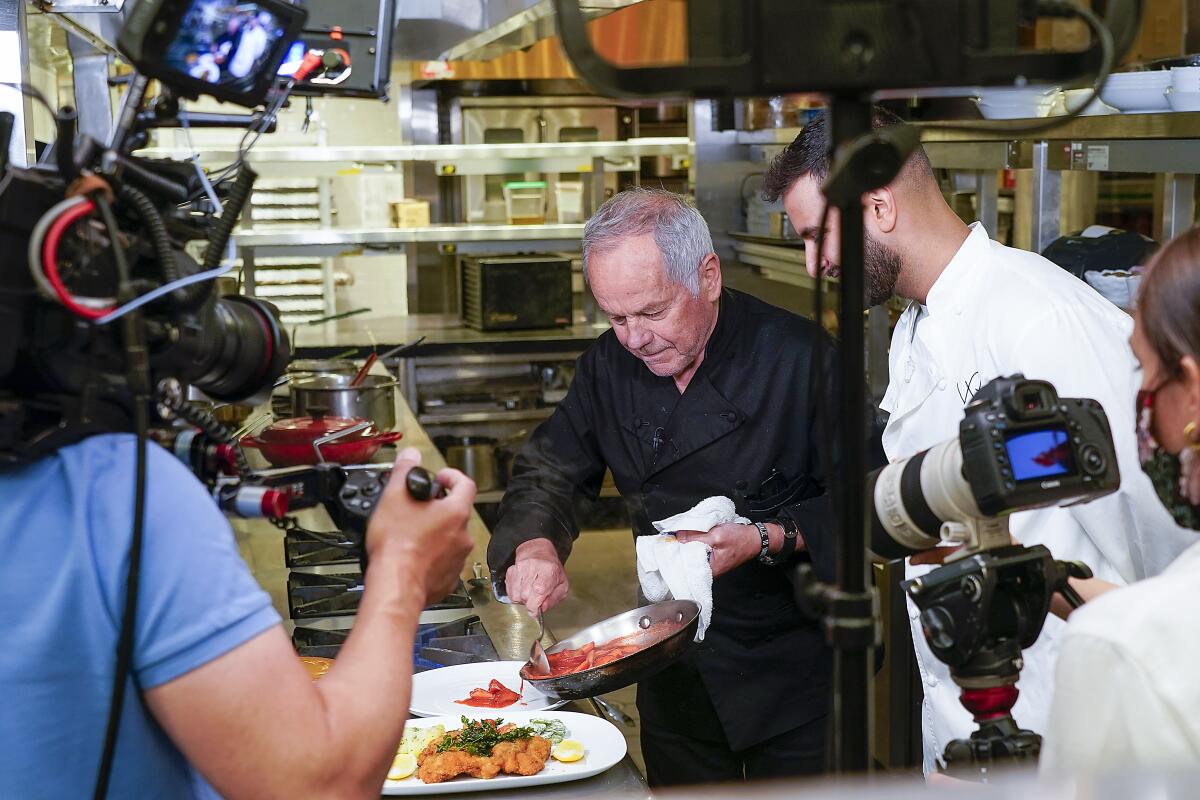
It was important to Gelb that the film portray its subject with honesty, showing Puckâs struggles as well as successes. Terrail and Puckâs former wife Barbara Lazaroff, both of whom had acrimonious splits from the restaurateur, appear in âWolfgang,â he says, because âtheyâre a big part of his story. For it to be a thorough and complete film, you need to have the different perspectives.â
Interviews with former Spago chefs Nancy Silverton, Mark Peel and Evan Funke, as well as food writer Ruth Reichl and Laurie Ochoa, a longtime food writer and a deputy editor with The Timesâ Entertainment and Arts team, remind viewers of Puckâs milestones that are embedded in our culinary DNA: gourmet pizza, Asian-fusion cuisine and Wolfgang Puck food at grocery stores.
âHe was the first chef since Chef Boyardee to say, âWhat if I take my food and make it available to people who are home cooks?ââ Reichl says in the film. âAfter that, he became a brand.â
Puck also helped to popularize a concept many take for granted: the open kitchen. By pulling back the curtain on meal preparation, Spago helped transform the chef from a figure hidden in the back to the star cooking on center stage. Together with Lazaroff, who designed the early restaurant spaces, Puck began building his brand and changing the perception of chefs and fine dining.
Before long, Puck became a regular on morning and late-night TV shows, such as âGood Morning Americaâ and âThe Late Show With David Letterman,â putting California cuisine on the map. It didnât hurt that Puck was blessed with boyish good looks, a charming Austrian accent and an ebullient personality. His television appearances helped set the stage for the Food Network and todayâs plethora of cooking programs.
With L.A. in the yellow tier of COVID-19 reopening, restaurants are booming. Check out these outdoor dining options for sushi, ramen, tacos and more.
Along the way, Puck became known as one of the first âcelebrity chefs,â a term that makes him bristle.
âI donât like the word because it doesnât mean anything. If youâre a painter, they donât call you a celebrity artist,â Puck says.
Still, his impact in Hollywood was undeniable. From its birth in 1982 in its original location on the Sunset Strip, Spago was the place to be and be seen.
âWolfgang is probably the best documented chef in history,â Gelb says. âItâs a blessing and a curse. Thereâs so much to choose from, but itâs very difficult to make those decisions.â
The 79-minute film weaves in scenes of Puckâs life in the spotlight with a whoâs who of A-list stars like Julia Roberts, Tom Hanks, Tom Cruise, Shirley MacLaine, Paul Newman, Sidney Poitier and Johnny Carson. Those flashy moments contrast with quieter scenes as Puck returns to Austria to reconnect with his sister, Christina, and the past that haunted him.
At one point, the siblings visit the cemetery where Puckâs grandmother, mother and stepfather are buried. Watching the film, Puck says, unlocked feelings about his stepfather that he had tried to suppress.
âWhen I came to America, I was 24, and I said, âMaybe I should bring my mother and my siblings over here to get away from him.â But they were scared. They thought he would come after us and kill us,â he says, recalling a particularly dark secret his sister shared with him after they were adults. âI was so upset. When he passed away, I said, âThrow his ashes in the river, donât put him next to our mother.ââ
But, he says, âAt the end of the day for me to prove my stepfather wrong motivated me.â
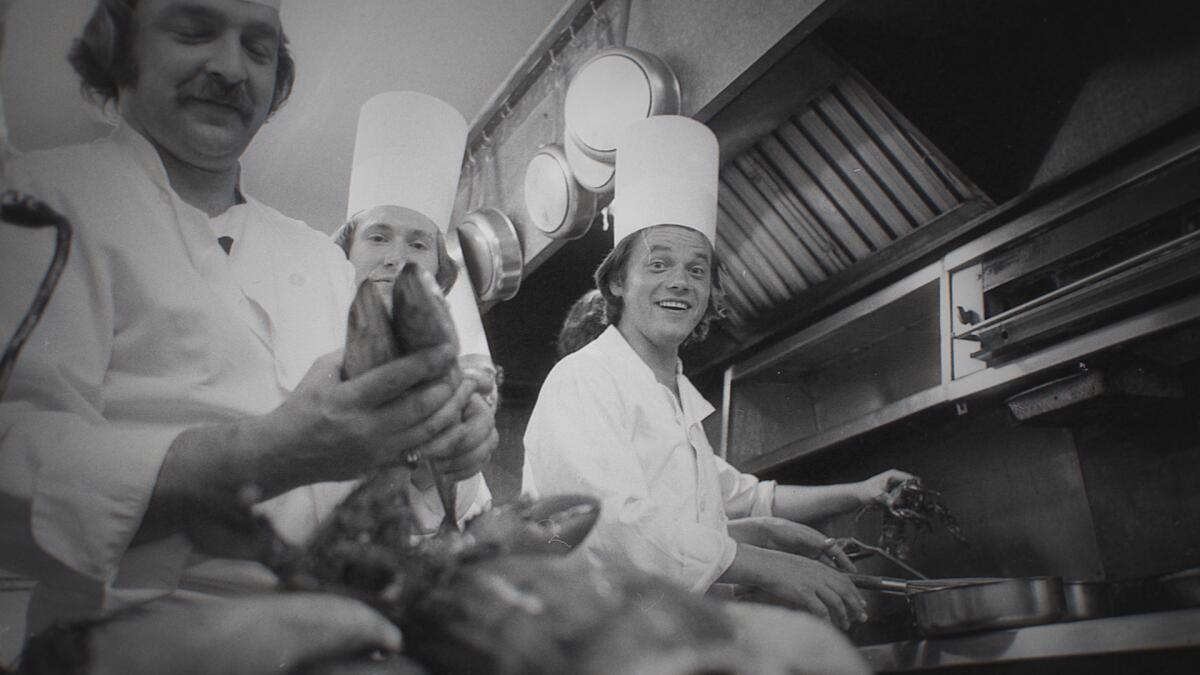
Fatherhood, Gelb says, is a key theme of the movie. âItâs something Iâve been interested in, going back to âJiro Dreams of Sushiâ â whatâs itâs like to live in the shadow of a very famous father,â says the filmmaker, whose father is Peter Gelb, general manager of the Metropolitan Opera, and whose grandfather was journalist Arthur Gelb.
âWolfâs biological father was absent. Then his stepfather was an abusive jerk. Now heâs put in a position where heâs a father. He doesnât have the template. He doesnât have someone who was his father by example,â Gelb says. âThat was a bit of a journey we explore in the film.â
Puck insists he has no regrets and prefers to think about the future rather than looking back â and his future continues to include growth. But even though his empire continues to expand, the chef may not be collecting as many glowing accolades as he once received.
Two years ago, Times restaurant critic Bill Addison returned to Spago and made the following observations: âWhen Puck opened Spago with Barbara Lazaroff in 1982, it hastened stuffy Continental diningâs undoing. ⌠Continental-French cooking is having a resurgent moment across America, but to see the restaurant that helped spur a culinary revolution serve a dish, without irony, that summons the traditions Puck once rebelled against is a real trip. Truly, everything is cyclical.â
Puck says he feels no pressure to keep innovating, but he isnât ready to rest on his laurels. âI donât get up in the morning and say, âIâm going to innovate,ââ he says. âThis is my life. This is my DNA. This is what I love to do.â
With a possible end in sight to the pandemic, Puck is beginning to reopen his restaurants. Heâs launching a new one in Budapest and has just signed a deal in Saudi Arabia. Heâs toying with the idea of a coffee table book featuring photographs â but no recipes â of dishes from his WP Test Kitchen, which offers an intimate tasting menu. And he might just be making an appearance on a popular TV food show. âWe cannot talk about that,â he says after letting the name slip, âor theyâre going to send me a bad note.â
But what he really wants to do most, he says, is spend time with his family. His wife, Gelila Assefa, and their two teenage sons, Oliver and Alexander, and his older sons from his marriage to Lazarus, Cameron and Byron, all appear in âWolfgang.â Assefa is creative director for Wolfgang Puck Co., and Byron has followed in his fatherâs footsteps as a professional chef and oversees Puckâs new West Hollywood restaurants Merois and Ospero.
âI think the grandest achievement today is really the balance I have with my family,â he says. âI want it to say one day on my tombstone not that he made good pizza. I want it to say he was a good father and a good husband.â
More to Read
Eat your way across L.A.
Get our weekly Tasting Notes newsletter for reviews, news and more.
You may occasionally receive promotional content from the Los Angeles Times.
